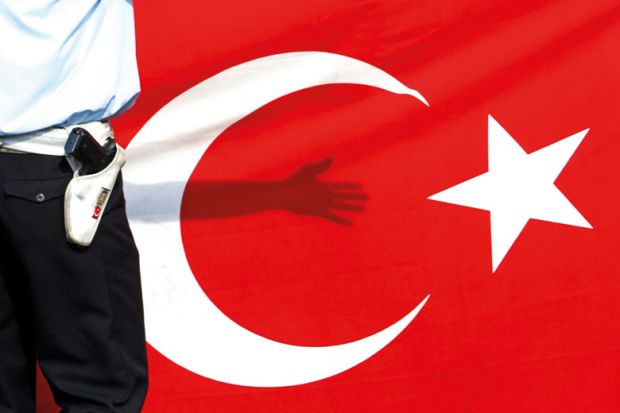Since the start of the year, scholars in Turkey have taken up strange habits. Some have started flying and filming kites with their students, then posting videos on the internet late in the evening. Some have started songwriting, producing strange lyrics. Some are organising bus tours.
My mobile phone has never seen so much WhatsApp action: it is now full of photos, songs and conversations about these bizarre scholarly activities.
Meanwhile, others have started keeping tallies. A tally of those who lost their jobs. Another tally for very serious threats. Another for disciplinary actions. Yet another tally of those who suddenly lost their research or travel grants. The tallies are updated every week.
This is a true story. I am one of those who lost their job. On 29 April, after months of mobbing, I was summarily dismissed. I was found at fault for signing a peace declaration, for calling on the government to stop its ruthless and senseless military campaign in the southeast of the country. I believe that my dismissal from Doğuş University was part of an ongoing witch-hunt.
As a scientist, I do not believe in witches. But obviously the government does.
The Council of Higher Education circulated orders to universities, and internal investigations were initiated. In my case, the investigation was started on 18 January. I told the committee that I was expressing my rights, and that as a social scientist I had a duty to speak out. Shortly thereafter, I lost my position as chair of the psychology department. It was clear what was to follow.
Read next: Our in-depth feature on the situation in Turkey
I was soon found guilty and was dismissed weeks before the term was over. I was teaching four courses; one of them focused on peace psychology.
Yes, I do believe in peace. But the government does not. And I firmly believe that I have a right to live in peace, to invite authorities to establish peace, and to express my opinions freely. As a scholar, I believe that freedom of speech is essential for democracy, and indeed for the very existence of universities. But the government does not. Turkey is now full of universities where seeking or speaking the truth is not very popular.
Even scepticism is not tolerated. The country is at war, and in times of war a strong leader is needed. Dissent is considered treason. Academic freedom is, after all, a luxury.
I was not the only one who lost their job. Aslı Vatansever, a sociologist, was dismissed along with me. We received the same sentence, the same injustice, and are now tallied. And the tallies are getting uglier and longer. A criminal investigation is under way and the government sent a warning: four scholars were arrested and swiftly sent to prison.
All they did was to speak at a press conference to reiterate the demands made in the petition. That is when the kites emerged. Scholars and students flew kites right outside of the prisons. Kites symbolise freedom, so the message was: “Freedom and peace will prevail.” The bus tours were also an act of solidarity. Scholars, journalists, peace activists and students were bussed to two prisons where they kept vigil. And those scholarly songs? All songs of peace and freedom.
Speaking the truth has become a very dangerous act in Turkey. I will let others speak instead.
The United Nations High Commissioner for Human Rights, Zeyd Ra’ad Al Hussein, recently asked for an independent investigation of civilians who were burned to death in Cizre. Erik Jan Zürcher, a renowned historian, returned a medal of honour given to him in 2005 by the president of Turkey. “Basic freedoms in Turkey are no more,” he said. The hope for a democratic Turkey has vanished. Yervant Bostancı, a musician, recently said he had difficulty expressing what he had witnessed in Suriçi, Diyarbakır, the place where he was born and bred. “I am very, very sad,” he said. “It is as if my soul is bleeding.”
I was recently told that I am a “scholar at risk”. If that is true, the same label can very well apply to the entire academy. Universities in Turkey are at risk because academic freedom is disappearing. And so is the future of Turkey.
This is why my soul is also bleeding. But I do have hope. Kites will fly, tyrants will fall. Truth will eventually prevail, and so will peace.
Serdar Değirmencioğlu (serdardegirmencioglu@gmail.com) was professor of developmental and community psychology at Doğuş University in Istanbul.
Write for us
If you are interested in blogging for us, please email chris.parr@tesglobal.com
后记
Print headline: Academic freedom disappears in Turkey




